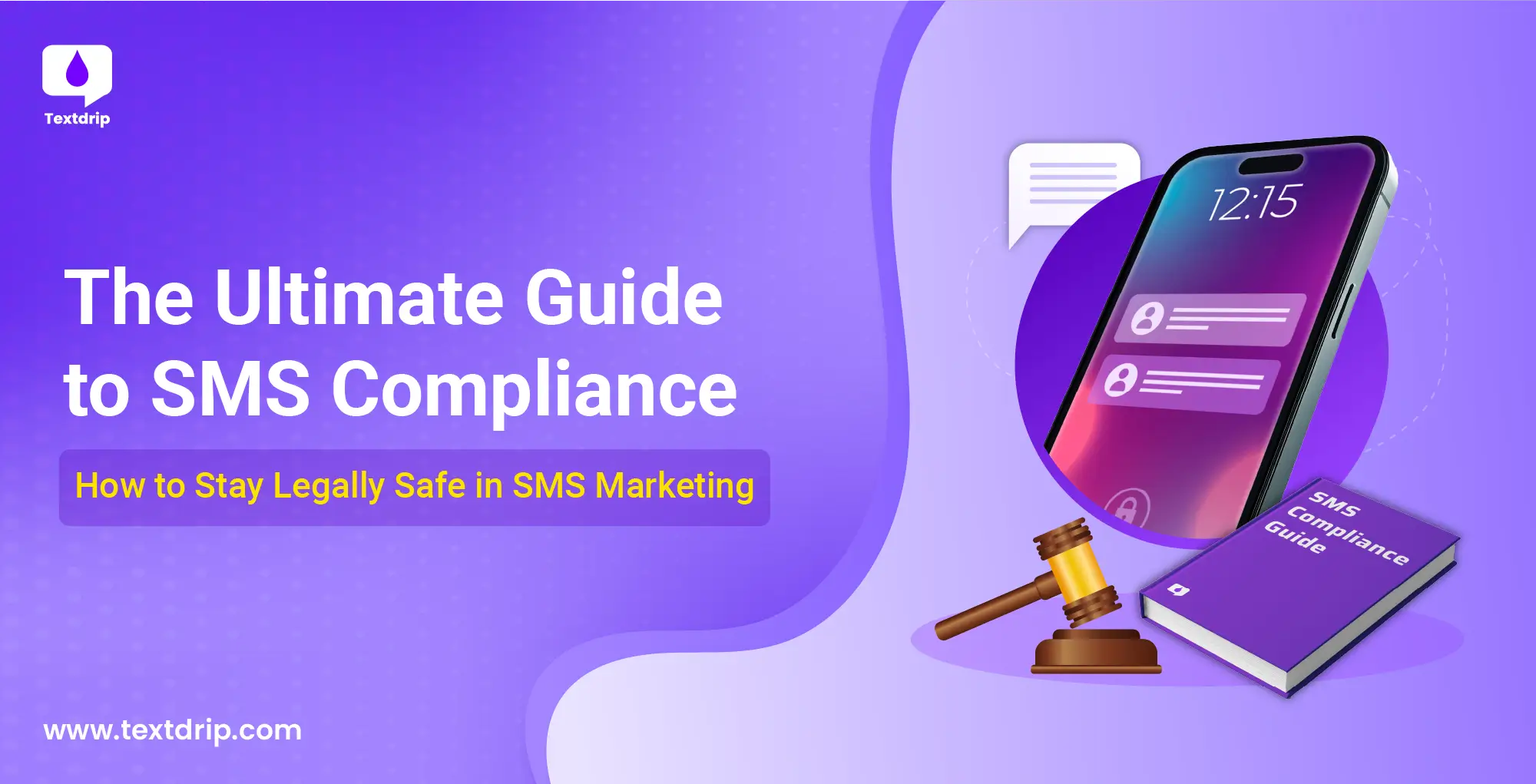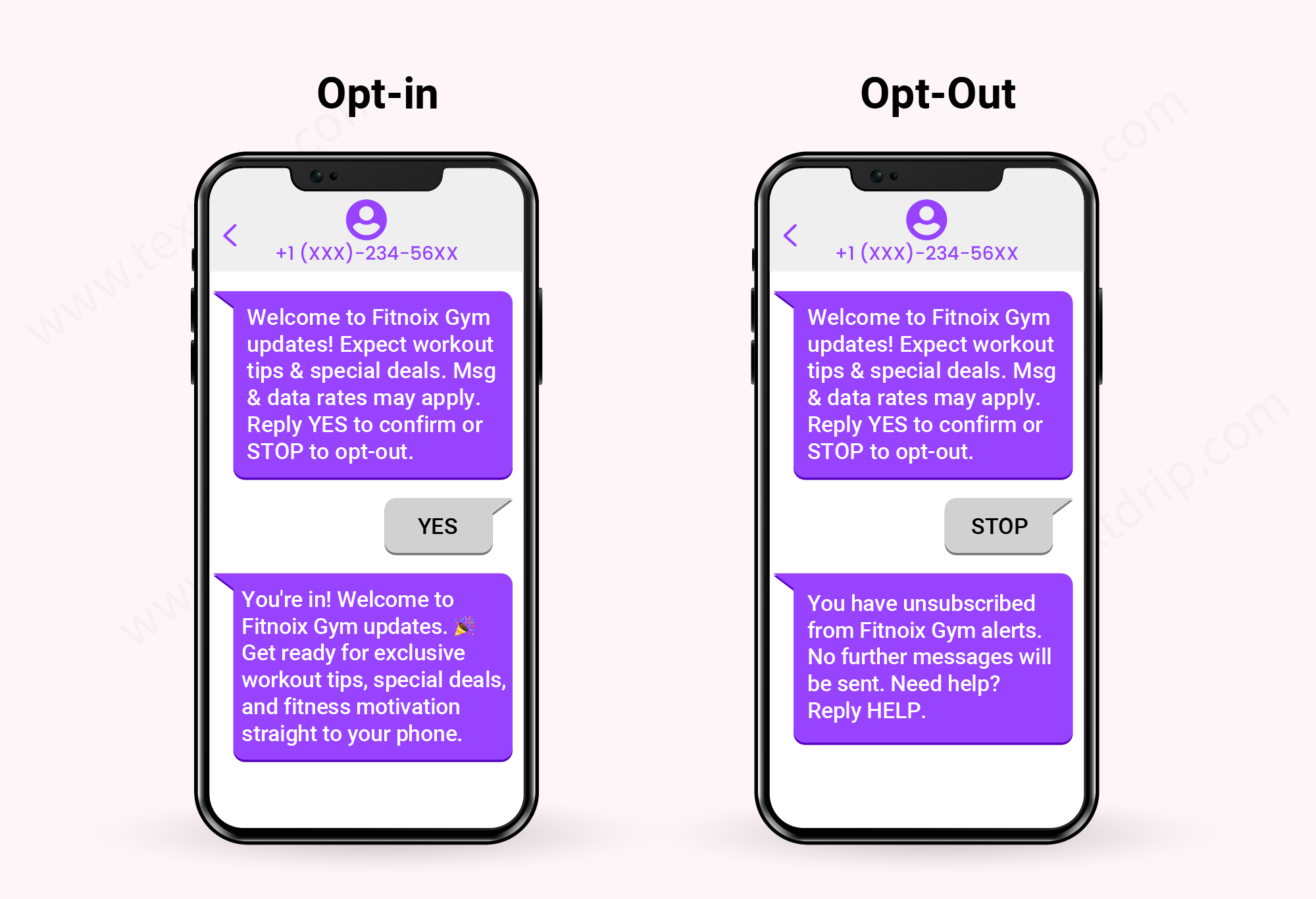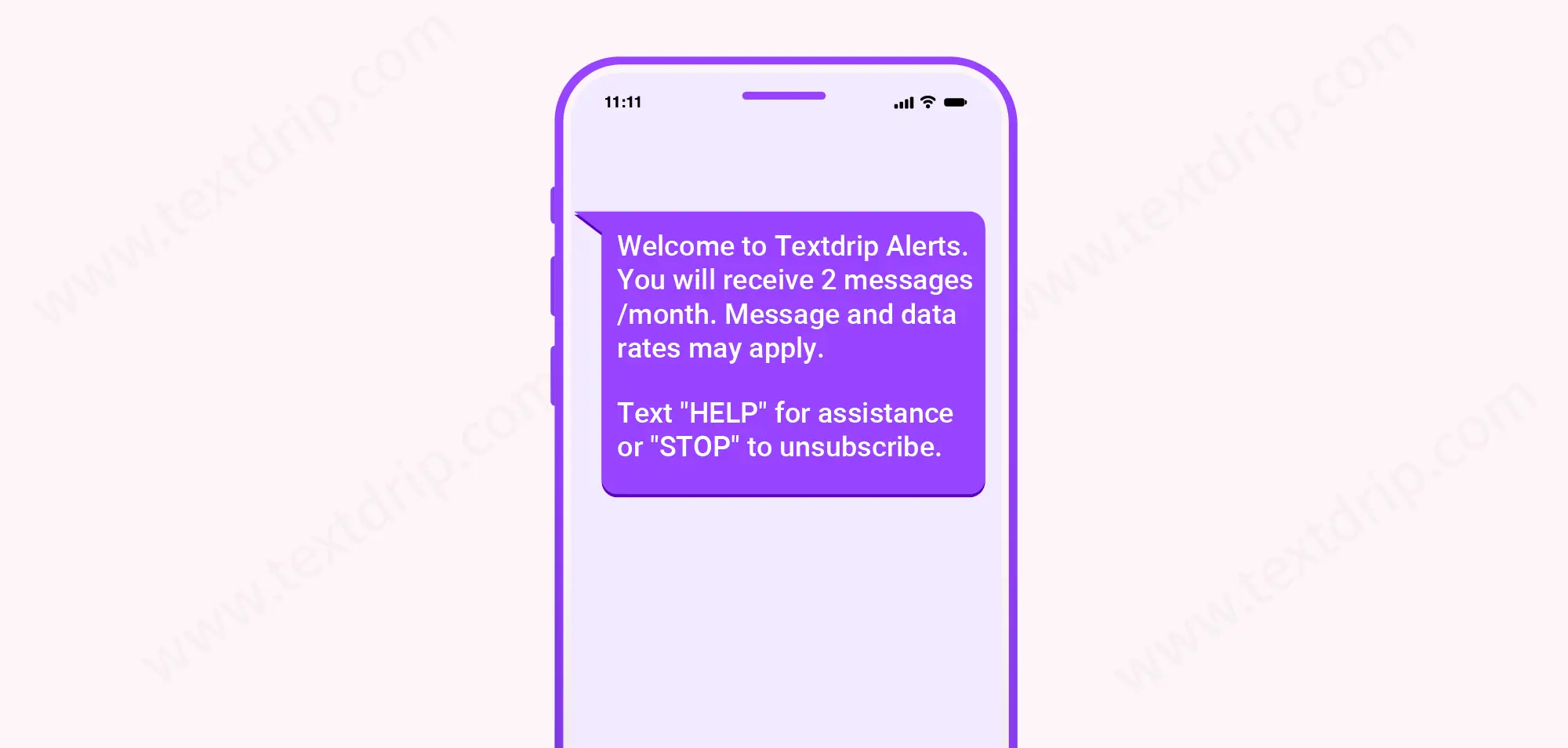18 Feb 2025
Dhaval Gajjar

18 Feb 2025
Dhaval Gajjar
SMS marketing provides an instant way to reach your target audience. However, before taking advantage of this powerful marketing channel, you must be well-versed with the existing SMS compliance guidelines to protect customers and businesses. Wondering why it is so essential? Read on to find its answer.
Carvana, DoorDash – all these brands have something in common. Recently, they have violated TCPA by sending unsolicited marketing SMS without consumer consent. The key thing to note here is that if your business violates TCPA rules, you have to pay for legal damage ranging from $500 to $1,500, depending on the severity of the violation. This non-compliance can cause significant financial and legal consequences and even affect the brand’s growth. Therefore, companies must prioritize SMS marketing compliance to avoid hefty fines and maintain their business reputation.
This guide helps you understand everything about text messaging compliance guidelines and best practices. So, without wasting much time, let’s get started.
SMS compliance means obeying text message communication rules and regulations. It protects customers from unwanted messages and ensures businesses communicate respectfully and legally with their consumers. So, consumers don’t have to deal with spam text messages and unwanted communication.
SMS marketing compliance is important because if businesses don’t obey these laws, they have to face severe consequences like fines, lawsuits, and even damaged brand image. Consumers will also trust only those brands that respect customers’ privacy and preferences.
Few government bodies regulate the commercial usage of text messages for local and foreign businesses. Here are a few important regulators and their specific regulations:
The full form of TCPA is the Telephone Consumer Protection Act. The federal law in the U.S. looks after telemarketing calls, pre-recorded calls, and text messages to protect consumers from unsolicited marketing practices. This act restricts telemarketing calls and the usage of automated systems to send unsolicited messages.
As per the TCPA act, businesses must obtain prior express written consent from customers before sending them marketing messages. This consent must be documented via opt-in forms. Also, customers must clearly agree to receive the text messages. Also, using an automated dialling system to send mass text messages is restricted under TCPA, so marketers should not violate it. If businesses do not comply with TCPA rules, penalties can range from $500 to $1,500 per violation. Besides, businesses must respect DNC compliance, which lets consumers opt out when they don’t want to receive messages from any business.
The latest TCPA rules update even suggests prioritizing opt-out through negative keywords like “I am not interested”, “I don’t want to hear from you”, etc., instead of “STOP” or “Unsubscribe.”
The CAN-SPAM Act was designed to prevent unwanted email but also applies to SMS marketing. Businesses must include clear opt-out instructions in each text message so that consumers can stop receiving messages at any time.
Each SMS must include proper identification of the sender along with the physical address of the company/business. If the business violates the CAN-SPAM Act, they have to pay hefty fines per violation.
It stands for Cellular Telecommunication Industry Association, which represents the wireless communication industry in the U.S. This government body sets guidelines and best practices for ethical SMS marketing. These guidelines are not legally binding, such as those of the TCPA or CAN-SPAM Act, but they are recognized as the best practices for responsible SMS marketing.
According to CTIA, businesses must provide clear and easy-to-understand opt-in and opt-out options for consumers. It can be done through simple SMS keywords such as YES to subscribe and STOP to unsubscribe. Businesses must specify message frequency and should never send more messages than consumers have agreed upon at the time of opt-in. The message content should be transparent and clear.
Besides Federal regulations, there are certain states that have their own laws that administer SMS marketing. One of them is CCPA. This law gives consumers more control over their personal data. As per the CCPA – California Consumer Privacy Act, businesses must reveal the types of personal information they collect and how it will be used. Businesses in California must ensure that they remain compliant with these requirements while collecting consumer data.
Some other states have their regulations about unsolicited text messages and DNC compliance. It incorporates specific rules for how businesses must handle customer data and ensure privacy.
The FCC – Federal Communications Commission is an independent U.S. government agency that regulates interstate and international media communications. Its consumer protection rule ensures consumer protection from unwanted and intrusive communications like requiring opt-in consent for SMS marketing.
Also, the law lets carriers block illegal robocalls and unwanted text messages. It improves customer protection against spam and fake text message communications.
It stands for Federal Trade Commission. This agency oversees compliance with violence and theft through media and enforces laws. It protects consumers from spam messages. They started regulating text messages in 2009 and ensure you offer a clear way to opt out and only text people who have opted in. If you follow these basic guidelines, you can protect your business from the FTC’s radar.
Mobile Marketing Association – MMA is a nonprofit organization composed of mobile marketing companies. It advertises mobile marketing worldwide. MMA uses peer-driven best practices to manage and develop current mobile marketing industry initiatives.
If you want a smooth experience with your business outreach, here are a few core SMS compliance requirements you must remember.
Obtaining explicit consent is the most basic and critical aspect of SMS marketing compliance. Businesses must obtain consent from consumers before sending them marketing messages. The consent must be clear, documented, and revocable.
It means your consumers must fully understand what they’re opting into. The consent must be properly recorded and stored via SMS keywords, web forms, or other means for legal purposes. Businesses must give consumers an easy way to opt out of further messages.

The Opt-in and opt-out process must be simple and easy. Your consumers must quickly sign up and unsubscribe. Sending simple STOP messages should let consumers opt out of receiving further text messages from the specific business. Besides, businesses must offer clear instructions on how to opt-out. Here is how you can create effective opt-out text messages.

Each SMS marketing message must incorporate certain revelations to comply with regulations such as sender’s identification, opt-out instructions, and message frequency. Businesses must disclose their identity in SMS and offer a clear way to opt out of future messages. Also, it lets consumers know how many text messages they can expect to receive in a week/month.
The following SMS compliance terms every marketer should know.
It is an act that consumers perform to receive text messages from your business. Generally, customers opt-in to enter the phone number in a web form or select a checkbox to receive exclusive offers/notifications.
An opt-out occurs when subscribers no longer want to receive text messages from businesses. Subscribers can easily opt-out using SMS keywords such as STOP, UNSUBSCRIBE, etc., to opt-out from the text message campaign.
Do not contact. It is a list of consumers who want to opt-out or don’t want to receive marketing messages.
Person-to-person messaging is something people use in their everyday lives. When you send a text message to a friend or family member, it is P2P messaging.
It stands for application-to-person messaging, which does not fall in the P2P category but is A2P messaging. It includes marketing messages, alerts, customer support messages, appointment notifications, etc., sent by an SMS marketing platform.
A five or six-digit number that businesses use to send text messages is called short code. Short code texting is usually used to send bulk texting, promotions, and marketing campaigns
A 10-digit number such as landlines, 10DLC numbers, and local virtual numbers are long codes.
Unwanted messages sent to consumers without obtaining explicit consent from them are called text spam. Here are some spam text message examples.
It is completely free for the end user and can be used for SMS and MMS messaging.
Text messages are sent to inform or update customers about essential information, which is called transactional text messages. It includes order confirmation, shipping updates, and identity authentication.
Marketing messages that are sent to generate sales or engage the audience are called promotional text messages. It includes new product launches, webinar information, etc.
The following are the best practices businesses must follow to ensure compliance with SMS marketing regulations.
When you use the right tools, you can significantly reduce the risk of non-compliance. Tools such as Textdrip and Positiveintent.ai offer advanced features that will help businesses stay compliant.
For example, Textdrip supports 10DLC registration. It ensures that businesses use properly registered local numbers so they don’t have to pay hefty fines. Landline Remover Integration lets you remove landline numbers from your subscriber list so your SMS marketing campaign reaches the right audience and remains compliant with DNC rules.
Another tool, Positiveintent.ai, helps analyze and automate compliance checks. It ensures your SMS campaign follows all required legal standards, such as opt-in, opt-out, and message frequency.
Generally, SMS compliance standards are constantly evolving. Here is how you can stay updated with the latest regulations.
In a nutshell, businesses that want to stay legally safe and trustworthy in the eyes of their customers and the law must prioritize SMS compliance. If you remain compliant, you’ll send text messages to the customers who genuinely want to hear from you. Therefore, you will see a higher response rate and improved conversion rate.
SMS marketing platforms like Textdrip can help you simplify SMS compliance tasks and be free from legal risks. In the end, you need to prioritize obtaining proper consent, offer easy-to-opt-out options, and maintain transparency with your customers. With the right practice, SMS marketing can be a valuable tool for your business. So, without waiting much, book a demo and experience how SMS marketing compliance can improve your business ROI.
SMS marketing compliance refers to adhering to legal regulations and best practices when sending text messages for marketing purposes to ensure privacy and avoid penalties.
DNC compliance ensures you’re not sending marketing messages to individuals on the Do Not Contact list. It’s crucial to avoid legal penalties and protect customer privacy.
Violating SMS marketing compliance can lead to significant fines, lawsuits, and loss of reputation. It can also result in your business being banned from certain messaging platforms.
Regularly scrub your contact list, ideally monthly or quarterly, to ensure you’re not sending messages to anyone on the DNC list and to maintain compliance.